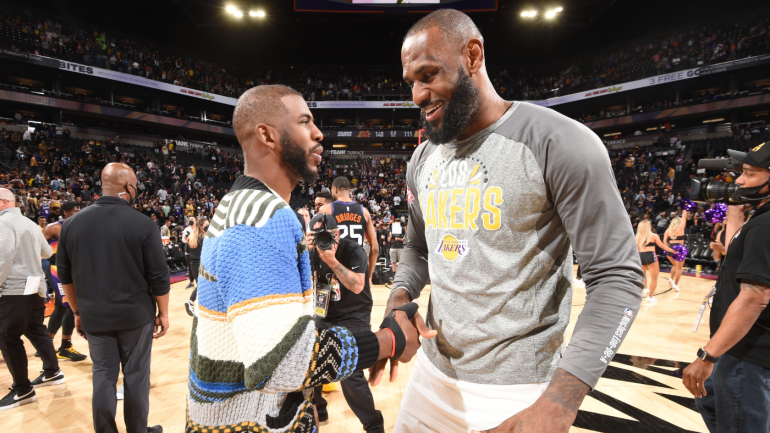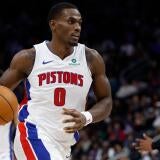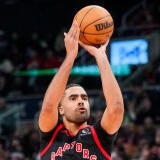How Chris Paul could help the Lakers solve their D'Angelo Russell problem, and their Kyrie Irving dilemma
Paul checks a lot of boxes for both the Lakers and LeBron James

The Los Angeles Lakers have spent the past three years trying to find LeBron James a suitable point guard. Dennis Schroder was a bust in his first tour through Los Angeles and only succeeded in his second as a minimum-salary reserve. Russell Westbrook was an unmitigated disaster, and while the Lakers tried to limit the damage with a number of past-their-prime veterans -- Rajon Rondo, Isaiah Thomas, Darren Collison, Patrick Beverley -- things only really turned around when they swapped Westbrook for D'Angelo Russell.
The Lakers closed the regular season 12-5 with Russell in the lineup after they acquired him at the trade deadline, and they proceeded to reach the Western Conference finals as a No. 7 seed with him at the helm. The five-man starting lineup featuring Russell, James, Anthony Davis, Austin Reaves and Jarred Vanderbilt outscored opponents by 37 points in 77 regular-season minutes and then outscored the second-seeded Grizzlies by 41 points in 85 first-round minutes.
The theory of the James-Russell partnership made sense in lower-stakes moments. Russell can shoot well enough to play off of the ball when James wants to run the offense and can create good enough looks out of pick-and-roll to allow James possessions to rest. If Russell was capable of doing that for four rounds, the Lakers would be in great shape.
Of course, he isn't. After an up-and-down series against Memphis, the Lakers played better with Russell on the bench for the bulk of their series against the Warriors, and then when the time came to face the Nuggets, Russell was downright unplayable. He scored 25 total points as the Lakers were swept in the conference finals and Los Angeles lost his minutes by 47 points. Jamal Murray switch-hunted him relentlessly on defense, and he couldn't make up for it on offense, where he has struggled throughout his playoff career. We have seven years of evidence suggesting that Russell is a pretty valuable player from October through April, but what we've seen in the spring is far less encouraging.
That would make relying on Russell to the tune of a starting-caliber contract far too risky for the Lakers this offseason, especially since James, according to Bleacher Report's Chris Haynes, "wants to fade more into the role as a secondary scorer and playmaker." Take a wild guess at who James would probably prefer as the primary ball-handler for the Lakers.
We know that Kyrie Irving tried to recruit James to Dallas. We know that James was publicly disappointed when the Lakers didn't land Irving in February. Irving is set to become a free agent in July. James, one of the NBA's preeminent big-game hunters, would surely like the Lakers to find a way to acquire him. There are theoretical paths to them doing so, but they would deprive them of the depth that helped power their trip to the Western Conference finals. Lakers president Rob Pelinka called keeping last season's core together "a high priority."
The Lakers don't sound especially enthused by the idea of chasing Irving. They still need to find a way to add a ball-handler that can hold up deep in the playoffs. They'd like to find that player without compromising the depth they worked so hard to build last season, yet they undoubtedly still need to find a way to appease James, as keeping him healthy, rested and engaged is their only realistic path to a championship. No realistically available player checked all of those boxes before Wednesday. But now? Chris Paul presents a possible solution to all of these problems for the Lakers if he is ultimately waived by the Suns.
Paul, at this stage of his career, really shouldn't be playing high-level starter minutes for eight months. If the Lakers could sign him for the taxpayer mid-level exception while also retaining Russell, they could give themselves the best of both worlds at point guard. Russell could serve as the regular-season innings eater that helps keep Paul healthy and fresh, but when the playoffs arrive, the Lakers could turn more minutes over to Paul, who has the far superior playoff track record. While the risk of a Paul injury is always relatively high, the cost of signing him for the mid-level exception would be more than low enough to justify taking that risk.
While Paul wouldn't be able to ease James' workload in the way that Irving would, we know that the two of them have badly wanted to play together in the past. Paul tried to recruit James to Houston in 2018. James told Howard Beck in 2016 that he would even take a pay cut to play with three of his NBA besties, Paul, Dwyane Wade and Carmelo Anthony. Paul is the last player on that list James has never played with. Paul is the godfather of James' second son, Bryce, and he and the elder James have been friends since before they reached the NBA. LeBron could hardly ask for a better consolation prize to Irving.
Yet if Paul reaches free agency, the Lakers wouldn't have to gut their roster in order to sign him. While things are going to be somewhat tight if the Lakers do indeed give market-value contracts to Russell, Reaves and Rui Hachimura while retaining one or both of Malik Beasley and Mo Bamba on their non-guaranteed contracts, the Lakers have no means of acquiring Paul aside from, at best, the taxpayer mid-level exception. If he'd take it? That's a home run.
If not? The Lakers aren't going to go to the trouble of generating cap space for the sake of a 38-year-old point guard. If Paul's priority is still financial at this stage of his career, he'll find more lucrative offers elsewhere. But if he wants to play with his close friend, potentially win his first championship and return to the city where he spent his prime? The Lakers are an ideal fit.
If anything, signing Paul at that price might pay for itself. It could give the Lakers a bit of extra leverage in negotiations with Russell because they'd have a theoretical replacement in place. Russell has no other obvious destination in a free-agent class featuring limited cap space and superior point guards like James Harden and Fred VanVleet. His best bet is to use his Bird Rights to stay in Los Angeles. Leverage in those negotiations will be important to the Lakers, and Paul can provide some.
The last lingering question is how exactly Paul would fit into a playoff rotation. In short, it's hard to tell. Paul has declined considerably in recent years. He'll likely decline further in the coming years. He isn't remotely the same defender that he once was and he's far too reluctant to shoot 3-pointers. These are all legitimate concerns. Yet Phoenix, despite going just 4-3 in playoff games he participated in, won his postseason minutes by 39 total points. He's still a dangerous mid-range shot-creator especially late in games, and while he is limited physically at his age, he remains one of the smartest players in the NBA.
Paul would, at the very least, be the best ball-handler the Lakers have ever had to run bench lineups featuring Davis but no James. If he scales his shooting up enough, he might even be able to get the Laker offense to a point at which it's stable enough to give Jarred Vanderbilt more than the 16.5 minutes he played per playoff game, which would be a major defensive boost for the Lakers. If nothing else, he would soften the likely loss of Schroder, who is likely to receive a bigger offer than the minimum deal the Lakers signed him to last season.
Paul isn't a perfect solution here. A perfect $5 million solution doesn't exist to any problem in the NBA. But before the surprising news of Paul's possible release, the Lakers had no way of finding Russell insurance and satisfying James without blowing up the team that just got them to the conference finals. Now, Paul offers a potentially satisfying middle ground, a way to maximize Russell without succumbing to his weaknesses and end these Irving rumors once and for all.


















